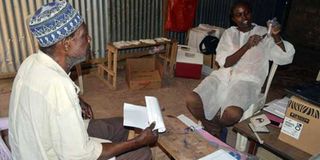At least 60 Kenyans die daily of TB while over 200 get infected, says advocacy group

A patient listens to instructions from a nurse during the launch of the 2015-2016 Kenya Tuberculosis Prevalence Survey at Mishomoroni in Mombasa in September 2015. According to Stop TB Partnership Kenya, at least 21,900 people die every year of TB while 100,000 get infected. PHOTO | KEVIN ODIT | NATION MEDIA GROUP
What you need to know:
- In Africa, Kenya is ranked fourth after South Africa, Nigeria and Ethiopia.
- Nine per cent of the daily TB deaths in the country are among children below 14 years.
- It costs the government at least Sh1.5 million to treat every TB patient.
- Currently, there are at least 600 multi-drug-resistant TB patients in the country.
At least 60 people die of tuberculosis (TB) in Kenya while another 270 get infected with the disease.
This is according to a TB advocacy group, Stop TB Partnership Kenya, which estimates that at least 21,900 people die every year of TB while 100,000 get infected.
According to the group’s national coordinator, Ms Evelyn Kibuchi, though TB is preventable and treatable, its spread is enormous in the country and treatment a huge cost burden to the government.
“It costs the government at least Sh11 billion every year to tackle TB.
“This money could be used for something else and that is why we aim to remove TB from the list of health issues competing for resources in the country,” said Ms Kibuchi on Tuesday during a media workshop.
She said despite efforts by the government, Kenya is ranked 15 out of 22 high TB burden countries in the world.
KENYA RANKS FOURTH
In Africa, it is ranked fourth after South Africa, Nigeria and Ethiopia.
She called on the government to take control of TB funding currently financed by donors.
“We want the government to be fully responsible for the TB programme because we would be incapacitated if donors withdrew aid.
“Many patients would die because of lack of treatment,” she said.
Nine per cent of the daily TB deaths in the country are among children below 14 years, she said and emphasised the need to carry out enhanced awareness campaigns on prevention and treatment of TB.
Children below 14 years are vulnerable especially because it is hard to diagnose TB infection in them, she said.
At least 39 per cent of all TB patients in the country are HIV-positive while the disease is most prevalent among the young and most productive, between 15 and 55 years, said Ms Kibuchi.
Some of the factors fuelling the spread of the disease are ignorance, lack of adherence to treatment, delayed treatment, stigma, poor access to services, low levels of TB awareness and TB-HIV co-infection, said Ms Kibuchi.
As a result, there have been cases of mutation of the disease to a multi-drug-resistant TB strain that is not only painful to treat but also costs the government at least Sh1.5 million for every patient, she said.
MULTI-DRUG-RESISTANT TB
Currently, there are at least 600 multi-drug-resistant TB patients in the country, but there could be more, said Ms Kibuchi.
“We appreciate what the government has done but we still have so much that can be done.
“The huge gap in funding of health programmes needs to be closed.
“We need to see a fully funded TB programme totally dependent on the government,” she said.
Despite the government’s commitment to controlling TB, the funding gap, limited treatment sites and having only two exclusion rooms in the country to treat multi-drug-resistant TB will work against these efforts, she said.
“One treatment site is not adequate for every county; there is (a) need for more treatment sites and at least one isolation ward in every county,” she said.
Multi-drug-resistant TB patients are supposed to be treated in an isolation ward.
Unfortunately, there are only two isolation wards in the country — one at Kenyatta National Hospital, which is no longer operational, and the other at Moi Teaching and Referral Hospital in Eldoret — said the national coordinator.




